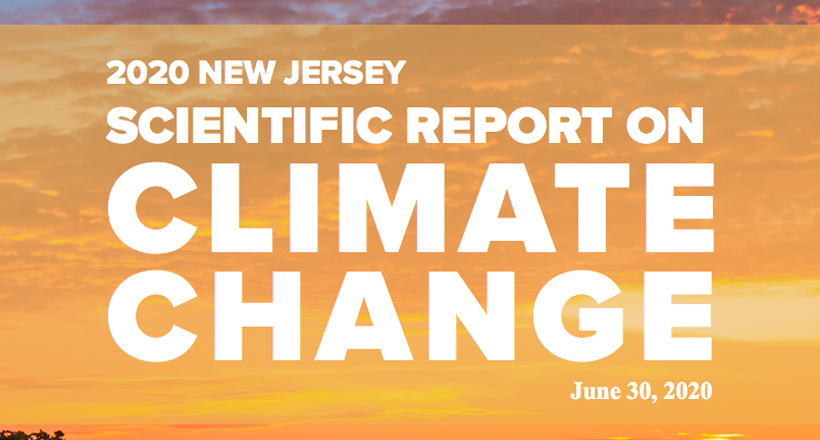CLIMATE IMPACTS
State Scientific Report Details Climate Change Impacts on New Jersey
NJDEP / NEWS RELEASE – New Jersey’s Department of Environmental Protection (DEP) has led a comprehensive effort to synthesize the latest and most reliable scientific information on the current and predicted future impacts of climate change on the Garden State, Governor Phil Murphy and DEP Commissioner Catherine R. McCabe announced today as they released New Jersey’s Scientific Report on Climate Change. The report is one component of the State’s comprehensive strategy to both reduce emissions of climate pollutants that fuel global warming, and proactively plan and prepare for the climate impacts that New Jersey cannot avoid.
According to the report, New Jersey has seen the evidence of climate change in its increasingly mild winters, more intense rainfalls, flooding along inland streams and rivers, and more tidal flooding along the coast. These events can threaten public health and safety, destroy property, undermine critical infrastructure, and damage New Jersey’s economy, including the vibrant tourism industry supported by our beloved shore and lake communities.
“As New Jerseyans know too well, the impacts of climate change threaten our property, public health, safety, and can wreak long-lasting damage to our economy,” Governor Phil Murphy said. “Almost eight years later, some residents of our state are still struggling to recover from Superstorm Sandy, and there are businesses and beloved landmarks that have never recovered. Just as we have seen with respect to the COVID-19 crisis, our commitment to environmental health will too create economic health. We know that now is the time for climate action, and DEP’s Scientific Report on Climate Change will shape our planning and response to this coming crisis.”
“Many of the impacts of climate change are already familiar to New Jerseyans, including increasing temperatures, rising sea levels, and more frequent and intense storms,” DEP Commissioner Catherine R. McCabe said. “As our climate continues to change, it is urgent that New Jerseyans understand what future impacts are likely to occur, and when. Together, we can plan for and adapt to those changes, helping one another to keep our communities safe and our economy strong. This report provides the information necessary to focus New Jersey’s strategic climate resilience planning initiatives while we work to modernize our environmental regulations, making them more responsive to these climate realities.”
As New Jersey’s Scientific Report on Climate Change explains, data indicates that as atmospheric levels of carbon dioxide and other greenhouse gases increase, New Jersey will experience significant direct and secondary changes in its environment. These include increases in temperature, variability in precipitation, frequency and intensity of storms, sea-level rise, ocean acidification and the associated impacts to ecological systems, natural resources, built environments, human health and the economy.
Key Findings from New Jersey’s Scientific Report on Climate Change
- Historically unprecedented warming is projected for the 21st century, resulting in longer and more frequent heat waves that impact larger geographic areas.
- Annual precipitation is expected to increase from 7% to 11% by 2050 and occur in more intense rain events that could result in an increase in localized flooding.
- By 2050, there is a 50% chance that sea-level rise will meet or exceed 1.4 feet and a 17% chance it will meet or exceed 2.1 feet, resulting in increased coastal flooding during sunny days and storm events, impacting infrastructure, residents and businesses. Sea level will further increase by 2100—by as much as 6 or more feet.
- Periods between rain events may be longer, causing drought conditions more frequently, increasing potential for reduced water supply availability, reductions in agricultural capacity that lead to shortages in food production and increased prices, and economic loss from impacts to livestock, and reductions in hydroelectric power production.
- Unabated CO2 emissions would reduce ocean pH, creating a more acidic ocean that could impact important marine and estuarine life and New Jersey’s thriving fishing industry.
- Increases in temperature expected as a result of climate change could intensify air pollution as well as respiratory and cardiovascular health concerns. Such impacts are of particular concern for already overburdened environmental justice communities.
- New Jersey’s agricultural yields could suffer as water supplies are stressed from an expanded growing season, while some crops may not thrive in warmer temperatures.
- Wildfire seasons could lengthen or become more intense as a result of hot, dry periods resulting from increased temperatures, potentially increasing the risk to New Jersey communities.
- The frequency and intensity of harmful algal blooms may increase, disrupting swimming and fishing in New Jersey’s lakes, and posing risks to drinking water reservoirs.
“This report will empower governments, businesses, and people across the state to better understand how climate change is impacting and will continue to impact all aspects of life in New Jersey,” said David Rosenblatt, the State’s Chief Resilience Officer and Assistant Commissioner for Climate and Flood Resilience at DEP. “The more we learn about and experience the impacts of climate change in New Jersey, the clearer our urgent need for resilience planning becomes. My DEP team and I are grateful for the incredible scientists and institutions whose work underlies this report, which will help facilitate our Statewide Climate Resilience Strategy and Coastal Resilience Plan to be presented later this year.”
New Jersey is Taking Action to Protect Against Current and Future Climate Threats
The Scientific Report on Climate Change is one component of New Jersey’s comprehensive strategy to both reduce emissions and proactively plan and prepare for unavoidable climate impacts. In October 2019, Governor Murphy signed Executive No. Order 89, appointing New Jersey’s first Chief Resilience Officer, establishing the Interagency Council on Climate Resilience, and ordering the development of Statewide Climate Resilience Strategy to protect and promote public health and safety, as well as the physical, economic and social vitality of New Jersey’s diverse communities. Governor Murphy followed up with Executive Order No. 100 in January 2020, ordering DEP to undertake the New Jersey Protecting Against Climate Threats (NJ PACT) initiative, which will modernize the State’s environmental regulations to implement reductions in greenhouse gas emissions, and build resilience measures into the State’s environmental land use rules.
“Under Governor Murphy’s visionary leadership, the NJBPU is proud to have joined DEP and our other state agencies in working to address the existential threat of climate change,” said Joseph L. Fiordaliso, President of the New Jersey Board of Public Utilities. “The Scientific Report is a crucial waypoint on our journey to 100 percent clean energy and further crystallizes our understanding of how climate change stands to impact our lives here in the Garden State. The findings clearly show that combatting this crisis is the most important moral obligation of our lifetimes. The NJBPU will continue to do all that it can to leave a healthy and safe New Jersey for our children and grandchildren.”
“We have already suffered the detrimental effects of climate change in New Jersey with serious flooding occurring in many of our communities. Climate change has and will continue to be a growing threat to our lives and livelihoods, and we need to be equipped with the knowledge to fight it,” said Lt. Governor Sheila Y. Oliver, who serves as Commissioner of the Department of Community Affairs. “The science-based data in this report will give our state an opportunity to better prepare for and mitigate the impacts. Taking action now will lead to greater adaptability and resiliency for future generations.”
“Expanding New Jersey’s green economy is a top priority for the NJEDA, because environmental protection and economic development go hand-in-hand. The DEP’s Scientific Report on Climate Change clearly demonstrates the pressing need for investing in clean energy and other green technologies that can reduce the worsening of climate change and help New Jersey build more resilient communities,” said New Jersey Economic Development Authority Chief Executive Officer Tim Sullivan. “I look forward to working with Commissioner McCabe and our partners at BPU and DCA to advance policies that grow our economy and create high-quality jobs while moving us closer to a more sustainable, greener future.”
Other Murphy Administration initiatives to fight the climate crisis include:
- The state recently announced plans to develop a more than 200-acre seaport that will facilitate offshore wind projects in New Jersey and throughout the mid-Atlantic.
- Governor Murphy unveiled New Jersey’s Energy Master Plan, a comprehensive long-term strategy for transitioning the state to 100% clean energy by 2050.
- New Jersey rejoined the Regional Greenhouse Gas Initiative, a 10-state group committed to cutting carbon emissions and reducing greenhouse gas emissions. The state generated over $40 million in proceeds from the first two RGGI auctions since rejoining in 2019.
- New Jersey has committed to expanding electric vehicle (EV) charging infrastructure and promoting electric vehicle through one of the best EV incentive structures in the country.
- The DEP partnered with Rutgers University to release The Rising Seas and Changing Coastal Storms study in December 2019. Data within the study, developed by leading climate change experts, is included in the Scientific Report on Climate Change and forms parts of the basis for modernizing New Jersey’s environmental regulations.
For a copy of the Scientific Report on Climate Change, and more information on climate change and resilience, visit www.nj.gov/dep/climatechange/



 Angel Alguera
Angel Alguera Daniel Gilkeson
Daniel Gilkeson Benjamin Goldberg
Benjamin Goldberg Surya Jacob
Surya Jacob Vineesh Das Kodakkandathil
Vineesh Das Kodakkandathil Douglas Leung
Douglas Leung Nihar Mhatre
Nihar Mhatre Justin Morris
Justin Morris Josephine O’Grady
Josephine O’Grady Jessica Parineet
Jessica Parineet Dillan Patel
Dillan Patel Moira Sweeder
Moira Sweeder